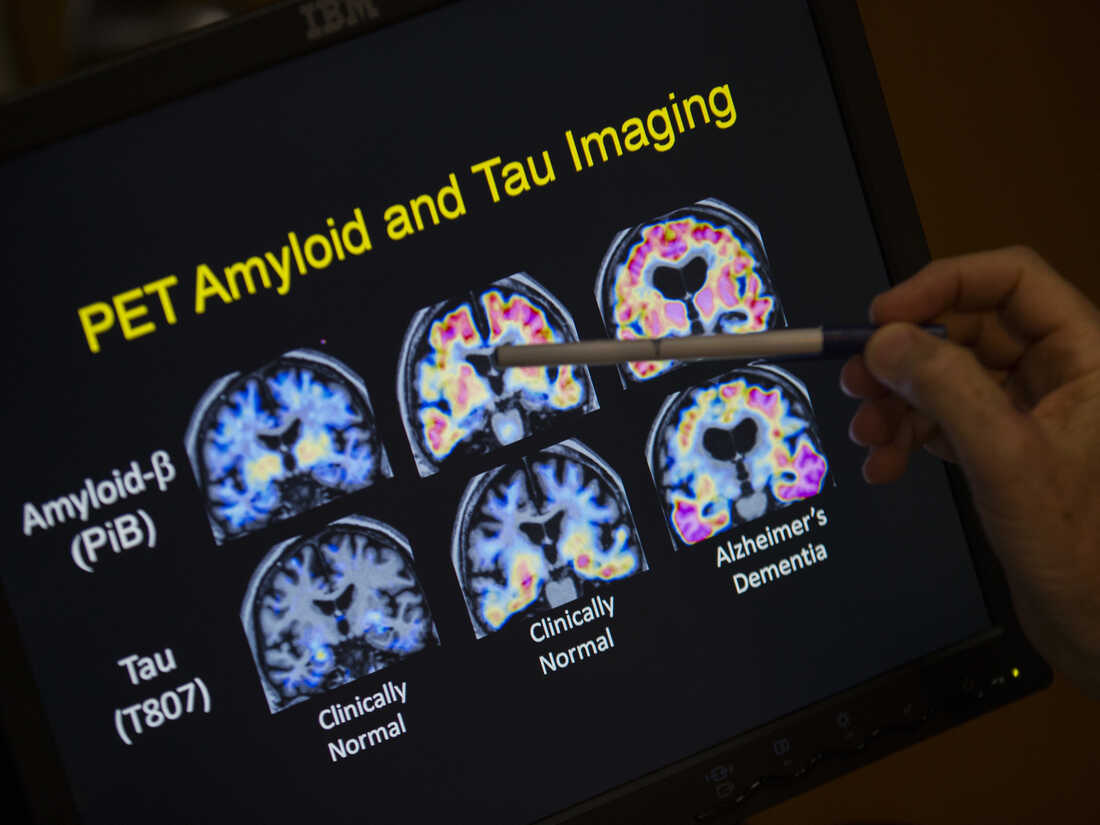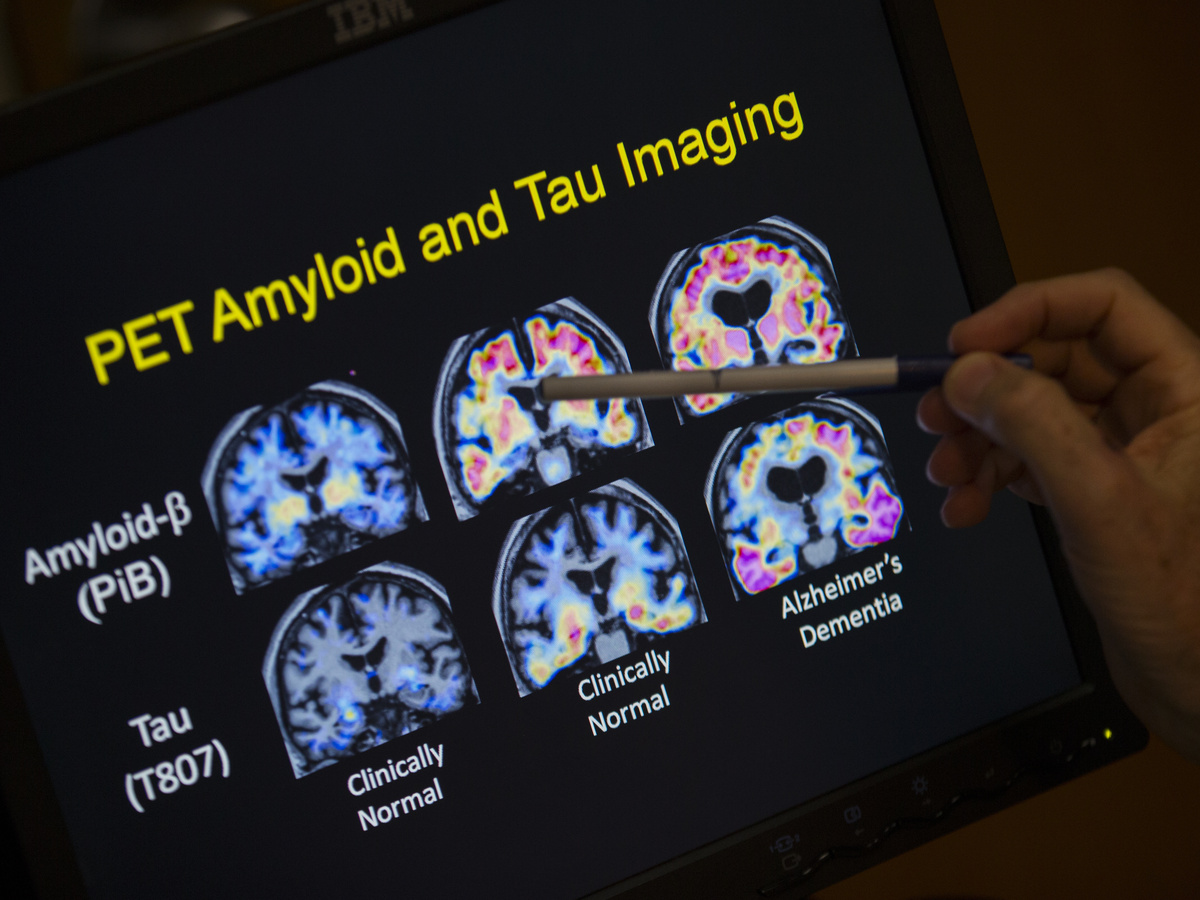
[ad_1]

A physician factors to PET scan outcomes which might be a part of Alzheimer’s illness analysis. Much work within the discipline focuses a substance referred to as beta-amyloid. A brand new research may take a look at whether or not that is the best goal.
Evan Vucci/AP
disguise caption
toggle caption
Evan Vucci/AP

A physician factors to PET scan outcomes which might be a part of Alzheimer’s illness analysis. Much work within the discipline focuses a substance referred to as beta-amyloid. A brand new research may take a look at whether or not that is the best goal.
Evan Vucci/AP
An concept that has propelled Alzheimer’s analysis for greater than 30 years is approaching its day of reckoning.
Scientists are launching a research designed to make or break the speculation that Alzheimer’s is attributable to a sticky substance referred to as beta-amyloid. The research will give an experimental anti-amyloid drug to folks as younger as 18 who’ve gene mutations that usually trigger Alzheimer’s to seem of their 30s or 40s.
The research comes after a number of experimental medicine have failed to forestall declines in reminiscence and considering though they succeeded in eradicating amyloid from the brains of sufferers within the early levels of Alzheimer’s. Those failures have eroded help for the concept that amyloid is liable for a cascade of occasions that finally result in the demise of mind cells.
“Many of us think of that as the ultimate test of the amyloid hypothesis,” says Dr. Randall Bateman, a professor of neurology at Washington University School of Medicine in St. Louis.”If that doesn’t work, nothing will work.”
The new experiment, referred to as the DIAN-TU primary Prevention Trial, is scheduled to start enrolling sufferers by the top of the 12 months.
An rationalization with a historical past
The amyloid speculation will be traced to Dr. Alois Alzheimer, a pathologist who first described the illness that will bear his title in 1906.
Alzheimer was working at a psychiatric clinic in Munich, the place he had the prospect to conduct an post-mortem on a lady who died at 50 after experiencing reminiscence loss, disorientation, and hallucinations. He noticed that the lady’s mind had an “unusual disease of the cerebral cortex,” together with “senile plaque” normally seen in a lot older folks.
In the Eighties, scientists showed that these plaques had been product of beta-amyloid, a substance that exists in lots of types within the mind, from single free-floating molecules to giant assemblies that kind the sticky plaques reported by Alzheimer.
Since that discovery, most efforts to deal with Alzheimer’s have concerned medicine that focus on numerous types of amyloid. And that strategy nonetheless is smart, Bateman says.
“We have 30 years of solid data, thousands of studies that all say this is sufficient to cause Alzheimer’s,” he says.
But doubts in regards to the amyloid speculation have been rising because the record of drug failures has grown up to now decade.
For instance, Bateman and a workforce of researchers had been unable to halt Alzheimer’s in a research of sufferers who received the anti-amyloid drug gantenerumab.
“What we found was that it had reversed the amyloid plaques in their brains,” Bateman says. “We did not have evidence of a thinking-memory benefit.”
Even so, Bateman and plenty of different scientists assume it is too quickly to desert the amyloid speculation.
“Penicillin, a great breakthrough, failed its first two clinical trials,” Bateman says. “Fortunately, people didn’t say, oh, the antibiotic theory is a bad idea and we should give up on it.”
Hints of a profit
Bateman is inspired by outcomes from current research of anti-amyloid medicine, even those that haven’t prevented cognitive decline.
Gantenerumab, for instance, appeared to delay a number of mind modifications related to the demise of mind cells, he says.
And the experimental drug lecanemab did seem to decelerate the lack of reminiscence and considering in a research of almost 1,800 folks with early Alzheimer’s illness, based on a statement from the drug’s maker.
Many research of anti-amyloid medicine could have failed as a result of they got to individuals who already had amyloid plaques of their brains. At that time, Bateman says, it might not be potential to cease the method that finally kills off mind cells.
So Bateman is optimistic in regards to the upcoming prevention trial, which is able to begin remedy a lot earlier.
“My prediction is it will work, and it will work fantastically,” he says. “If we can really prevent the plaques from starting and taking off and those downstream changes from going, my prediction is those people will never get Alzheimer’s.”
The prevention research is predicated on the concept that when amyloid begins to construct up, it causes a collection of modifications within the mind, says Dr. Eric McDade, a professor of neurology at Washington University who will oversee the experiment.
These modifications embody the looks of poisonous tau tangles inside neurons, the lack of connections between neurons, irritation, and, finally, the demise of mind cells concerned in considering and reminiscence.
“What we’re trying to do is to prevent that amyloid pathology from developing in the first place,” McDade says.
That form of prevention, although, will imply beginning remedy lengthy earlier than signs seem.
“At the point of somebody having symptoms, we know now that they probably have had amyloid in their brain for one to two decades,” McDade says.
So the four-year research will enroll about 160 folks from households with dominantly inherited Alzheimer’s disease. This type of dementia is attributable to uncommon, inherited gene mutations that trigger Alzheimer’s to develop in center age, usually in an individual’s 30s and 40s.
“The earliest they can come in is 25 years before we anticipate they would start to develop symptoms,” McDade says. “For most of these families, that actually puts them in their mid 20s when we’re going to start this trial.”
Like the sooner research that failed, this one will use the anti-amyloid drug gantenerumab.
The short-term aim is to ensure that amyloid plaques don’t seem. Then, researchers will look to see whether or not this prevents the looks of different markers of Alzheimer’s results on the mind.
One of those markers is the presence of neurofibrillary tangles, a poisonous model of a protein referred to as tau that types disorganized threads inside a neuron. These inner tangles disrupt a cell’s capacity to move chemical substances and vitamins from place to position and to keep up connections with different cells.
Another marker is mind atrophy, a shrinkage in a number of mind areas attributable to the lack of neurons and the connections between them.
“If we prevent amyloid pathology from developing and these other markers continue to develop and unfold,” McDade says, “this would be one of the best ways to say, listen, amyloid is really not what we should be targeting.”
[adinserter block=”4″]
[ad_2]
Source link


